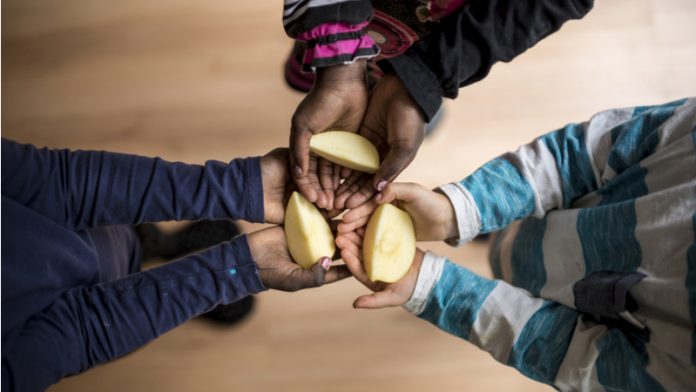The challenges posed by COVID-19 on food security were discussed in an online forum hosted by The Embassy of Italy to the UAE in partnership with Khalifa University and Dubai Future Foundation.
The impact of COVID-19 on the global economy and trade has highlighted the importance of food security and how countries need to prioritise domestic manufacturing of basic foodstuff to support their own population.
During a live online forum with speakers from Italy and the UAE, including H.E. Mariam Bint Mohammed Saeed Hareb Almheiri, UAE Minister of State for Food and Water Security, experts in Agri-Tech discussed how countries should be willing to adapt and embrace new technologies in the future to feed the world’s population.

Already a focus for the UAE, the country launched its National Strategy for Food Security 2051 in 2018, aiming to ensure access to safe, nutritious, and sufficient food all year round throughout the world. Yesterday’s webinar was hosted by the Embassy of Italy to the UAE as part of the InnovItalyUAE initiative, and the Ambassador of Italy to the UAE was joined by a range of speakers from industry and academia.
InnovItalyUAE looks at opportunities to enhance bilateral cooperation in innovation between Italy and the UAE, and is held in partnership with the Khalifa University of Science and Technology and the Dubai Future Foundation.
Agri-Tech: As a key for food security is the final forum in a series of six that have taken place over the last three months discussing innovation topics, ranging from smart cities to developing a global vaccine for Covid-19. The focus of yesterday’s webinar was around the framework of the 5th edition of the Week of Italian Cuisine in the World.
During his opening remarks, His Excellency Nicola Lener, Ambassador of Italy to the UAE said: “This forum highlighted the innovation that is taking place in the industry, and how we face and cope with the global challenges around food security in a post-pandemic world.
“There needs to be a coalition within the private and public sectors to see the true impact of COVID-19 on food systems and how we move forwards globally.
“Heading into Expo2020 Dubai, Italy’s production of food, how technology and food manufacturing is connected and the sustainability of food in Italy will be a focus for us at the Italian Pavilion.”
H.E. Mariam Bint Mohammed Saeed Hareb Almheiri, UAE Minister of State for Food and Water Security, said: “ We are blessed in the UAE to have leaders who have foresight in their DNA and have been building more resilient food systems. Currently, 90 per cent of foods consumed in the UAE are imported and we are aiming to reduce this dependency.
“Thankfully, our stringent strategy has ensured our supermarket shelves remained full during the lockdown, which shows the strength of our international partnerships and logistical network.
“Now is a time to reflect and re-prioritise; and we want to propel the UAE to the forefront of the Agri-Tech industry. The pandemic has shown that having a global, multi-faceted strategy is required and the UAE stands ready to share its knowledge to overcome future challenges.”
Commenting on the extensive research conducted in Italy, Stefano Vaccari, Director General, Italian Council for Agricultural Research and Analysis of the Agricultural Economy (CREA) said: “We are operating 12 research centres throughout Italy and sustainable management of the natural resources, air, water and soil in relation to food is at the heart of our research.
“We have been operating for over 80 years and have the most important plant bank collection of olive oil and cereals in the world. Some countries in the MENA region are starting to produce mozzarella and we hope our research will support similar developments.”
Liliana Stojanovska, Professor, College of Food and Agriculture, United Arab Emirates University added: “In 2016, obesity in adults in the UAE was 30 per cent compared to 22 per cent in 2007. In less than 10 years, obesity in adults here has increased by nearly 10 per cent and this needs to change.
“We work to promote, protect and improve the nutritional wellbeing of people in the UAE through high-quality education, research and outreach programs in human nutrition. We are working on innovative projects such as research into date seeds and our analysis is already showing compounds that we could exploit further to help improve our diets.”
Hector Hernandez, Assistant Professor, Biomedical Engineering Dept., Khalifa University said: “One of the issues we face in the industry is training the workforce, as currently, they have to go through a long academic process. We need to be looking at how we construct a certification program outside of the traditional degree system as there is a great need to train people and bring them up to speed.
“The sharing of data on a global scale to enable the rapid development of a vaccine for COVID-19 has shown what is possible, and we need to develop something like this to support Agri-Tech industry.”
Claudia Zoani, Sustainability, Biotechnology, and Agroindustry Division, Italian National Agency for New Technologies, Energy and Sustainable Economic Development (ENEA) continued: “We are working to enhance consumer confidence in the food chain. We conduct extensive R&D, and apply our technology to food producers to transform them into new ingredients.
“In view of a circular economy, these new ingredients can be used to produce products with high added value and organic and conventional products.”
Speaking on behalf of the largest research centre in Italy, Antonio Logrieco, Director, Institute of Sciences of Food Production, Italian National Research Council (ISPA CNR) said: “We have nine institutes across different regions of Italy and we study from farm to fork. Roughly one-third of the edible parts of food produced for human consumption gets lost or wasted globally, which is about 1.3 billion tons per year. Food waste produced at the end of the chain (by distribution or consumers), has the highest economic impact.”
Luca Simone Cocolin, Professor, Agricultural Microbiology, University of Turin and CL.uster A.grifood N.azionale CL.A.N. continued: “The agricultural food industry is looking into globalisation more and more. The pandemic has shown that if companies are not open-minded, it’s hard to survive.
“In the F&B sector, Italy currently exports Euro 44.6 billion of which 37.8 is from food and beverage manufacturing and 6.8 from the agricultural sector (2019). A lot of food companies in Italy are formed by very small groups of people, so you can imagine the economic challenges they have faced this year.”
Sulaiman Al Nuaimi, Government and Relations Executive Director, Al Dahra Agriculture said, “As a semi-government organisation, we own 500,000 acres across five continents. Our strategy is to support the food security for the UAE and other countries. We are looking to further improve our production methods, land and food and feed production. We have a robust and well-controlled supply chain and international networks.”
Stressing the importance of giving animals high-quality feed, Gian Luca Bagnara, the President of Italian Dried Fodder Association (AIFE) said: “If you put good food in, you get good food out. We need to feed our animals well. About 50 per cent of AIFE’s production of dried fodder is exported.
“We have no GM in our products, it is a natural, high quality product with a low environmental impact, with guaranteed sanitsation and traceability. As an industry, we need to think about precision feeding – like with humans – feeding animals according to their requirements or their health needs.”
Speaking from Serbia where the company owns a large amount of land, Emil Moukarzel, COO, Elite Agro LLC said: “We champion the UAE’s vision for the agricultural and food industry.
“We have one of the largest dairy farms in the UAE with over 5,000 dairy cows and use the latest technology alongside greenhouses and large open fields.
“We are also the largest producer of open field vegetables in the UAE and we have already planted 400 hectares of potatoes, sweet potatoes, onions and lettuces. Soil and water is one of the main priorities for food security in the UAE. Using desalinated water is expensive and the soil is 100 per cent sandy. We are looking into solutions to this and our research is proving very successful so far.”
Salvatore Lavallo, Head of Foreign Direct Investments, Abu Dhabi Investment Office (ADIO) continued: “The UAE has seen an increase of 9.1 per cent yearly domestic crop production growth and due to a growing population, there has been an increse in food demand of 80 per cent over the last decade.
“How we are developing as a nation and moving towards the future is what’s exciting abot the UAE. We are looking to change our reliability on imported foods and nurture and support agricultural investment. When we talk about food security we are not just talking about here in Abu Dhabi, we are looking a how we can create solutions for similar climates in other parts of the world as well.”
Marco Vieri, Full Professor, University of Florence and Aitronik srl said: “Smart farming could be a valuable tool in this context to improve production sustainability. There is a need for sustainable intensification and new strategies are about adopting innovation. There is great potential for further collaboration between Italy and the UAE in this industry. The UAE is quickly growing and eager to look at and adopt solutions.”
Paolo Glisenti, General Commissioner for the Italian participation at Expo 2020 Dubai added: “Agro food innovation will be considered by many participating countries as the main response to the post pandemic world at Expo2020 Dubai. Water resource usage and high-tech agriculture will be part of the advanced initiatives shown at the event. It will also signify the importance of the one health model – personalised medicine and innovative agriculture. I believe Italy and the UAE can play a strong role in joining forces with universities, research centres and companies at Expo2020 Dubai to further these advancements.”
Concluding the session, Maria Elena Provenzano, Farm Manager, Elite Agro LLC said: “The speakers have shown that collaboration and innovation is key, especially in light of the global challenges, growing demands for food, environmental resources and the imapact of COVID-19 on access to food and rescources. It highlighted how important it is to guarantee our consumers safe and nutritious food and the importance of a hollistic approach.”






